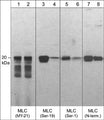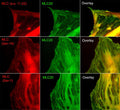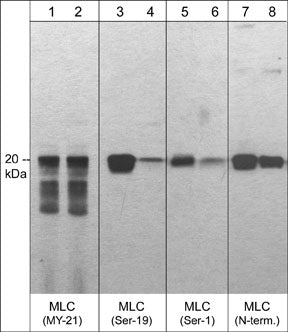Ships: 1-2 business days
Product Specific References for Applications and Species
| Immunocytochemistry: Human | ||
| PMID | Dilution | Publication |
| 32502416 | not listed | Aguilar-Cuenca, R, et al. 2020. Tyrosine Phosphorylation of the Myosin Regulatory Light Chain Controls Non-muscle Myosin II Assembly and Function in Migrating Cells. Current biology : CB, 2446-2458. |
| 22136066 | not listed | Beach, JR, et al. 2011. Analysis of the role of Ser1/Ser2/Thr9 phosphorylation on myosin II assembly and function in live cells. BMC cell biology, 52. |
| Immunohistochemistry: Rat | ||
| PMID | Dilution | Publication |
| 37645613 | not listed | Yadav, P, et al. 2023. EZH2 and matrix co-regulate phenotype and KCNB2 expression in bladder smooth muscle cells. American Journal of Clinical and Experimental Urology, 293-303. |
| Western Blot: Human | ||
| PMID | Dilution | Publication |
| 21695279 | 1:2000 | Aguilar, HN, et al. 2011. Phos-tag-based analysis of myosin regulatory light chain phosphorylation in human uterine myocytes. PloS one, e20903. |




